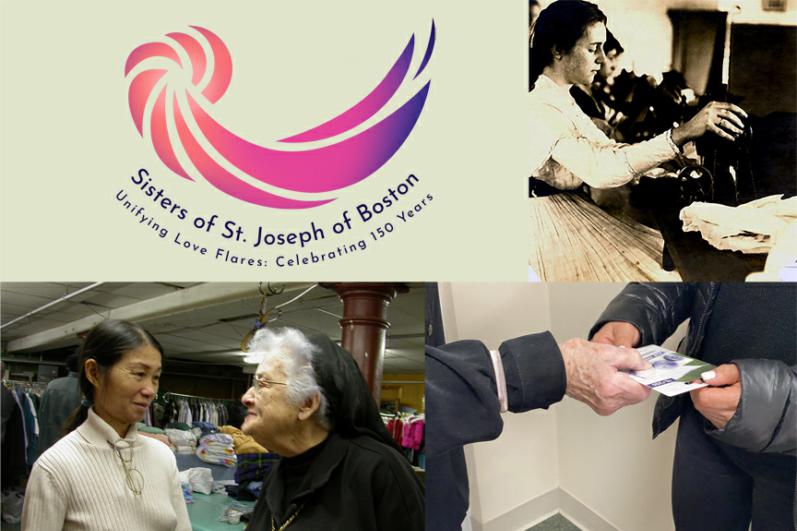All the works of which women are capable
Our own Sisters of St. Joseph of Boston are celebrating their sesquicentennial of arrival in the archdiocese. In the coming months, celebrating the Sisters' 150th anniversary, The Pilot will dedicate a page each month to some aspect of the past, present, and future of the sisters.
"They will undertake all the spiritual and corporal works of mercy of which women are capable." These words of Jesuit Father Jean-Pierre Medaille summarize the spirituality and mission of the first Sisters of St. Joseph in mid-17th century France. As we continue this series in celebration of the 150th anniversary of the Sisters of St. Joseph in Boston, this initial impulse expands.
We arrived in Boston to serve a rapidly growing population of Catholic immigrants. Sisters of St. Joseph have always realized our mission by assessing the needs of the neighborhood and responding in whatever way women are capable. Like immigrants of Boston in the late 19th century, the stirrings in the souls of today's immigrants have a familiar ring: the desire to live in union with God and one another, improve their quality of life, and live where human dignity prevails.
In 1899, Mother Genevieve, then superior of the congregation, became aware of the need for "girls deprived of their parents' aid" to be educated in courses that would "fit them to earn a respectful livelihood." Thus, the Daly Industrial School, owned by the archdiocese and staffed by the Sisters of St. Joseph from 1899-1956, began in Dorchester.
A story in our CSJ Archives recounts the experience of one resident:
Twelve-year-old Mary and her sister emigrated from Ireland. Her mother had died; her father struggled to find work in post-war Ireland. In Boston, he could only afford a single room. Needing a safe place for his daughters, he "looked to the Church" and enrolled them at the Daly Industrial School.
As a child brought up in hunger, Mary was shocked by the food. String beans, pork chops, and tomatoes ... food she had never seen or tasted in poverty-stricken Ireland. They were undernourished. One sister, who was herself an Irish immigrant, empathized and gave her eggnog to drink each morning. "She really saved me," Mary recalled.
In the latter half of the 20th century, Sisters Mary Olive Williams, CSJ, and Eustace Caggiano, CSJ, modeled love of neighbor in a profound way. A teacher and a cook, they began ministering to neighbors of Boston's South End Cathedral Parish -- a community that faced food insecurity and material poverty, rooted in xenophobia, systemic racism, and the poverty cycle. Sister Mary Olive's students taught her about their experience of hunger and living conditions often ignored by city officials. Moved to action, she insisted no one take notice as she delivered large grocery bags to residents of Cathedral Housing Project.
Sister Eustace Caggiano, CSJ, the cook at Cathedral Convent, befriended her Spanish-speaking neighbors and began offering food to children at the convent's back door. Soon, she ministered full-time at El Centro del Cardenal, the cathedral's Hispanic apostolate. Her ministry expanded to aiding immigrant families of many backgrounds and gaining a reputation as a friend to new Bostonians.
Both set an example of shared responsibility for the common good. A teacher and a cook could have reacted to poverty by saying, "That's not my job." Instead, they heard the voice of the marginalized, responded, and today unifying love flares.
These stories contain seeds of The Literacy Connection, The Women's Table, Casserly House, and Bethany Hill Place -- all ministries of the congregation that currently assist people who face disproportionate challenges for various reasons. In the wake of the pandemic, unifying love continues to flare in Brighton, Framingham, and Roslindale, where these ministries are located. Many donate food and gift cards distributed through back doors, on street corners, in parking lots, and wherever they meet the "Dear Neighbor."
This season of outreach and giving seems an appropriate time to reflect on varied ways in which Sisters of St. Joseph and those who partner with us continue the mission of our first sisters and do "all of which women are capable."
Learn more about our ministry by visiting our website, www.csjboston.org, or any of our many social media sites: Facebook.com/csjboston, Instagram.com/csjboston, Twitter.com/csjboston, YouTube.com/user/csjboston, and LinkedIn.com/company/sisters-of-saint-joseph-of-Boston.
Not on social media? Go to csjboston.org/instagram.
JOANNE GALLAGHER, CSJ, IS THE DIRECTOR OF COMMUNICATIONS OF THE SISTERS OF ST. JOSEPH OF BOSTON.



















